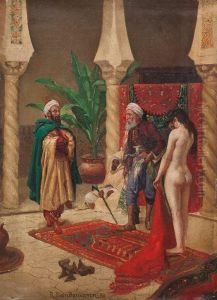Rudolf Christ. Eugen Bendemann Paintings
Eduard Julius Friedrich Bendemann was a renowned German painter associated with the Düsseldorf school of painting. Born on December 3, 1811, in Berlin, Germany, Bendemann was part of a generation of artists who played a significant role in the development of 19th-century German art. His father, Anton Heinrich Bendemann, was a Jewish banker, and his mother, Fanny Eleonore Bendemann née von Halle, came from a banking family as well. Despite his affluent background, Bendemann was drawn to the arts from an early age, a passion that was supported by his family.
Bendemann received his initial artistic training under the tutelage of Wilhelm von Schadow in Düsseldorf, where he moved in 1828. Schadow's influence was instrumental in shaping Bendemann's early career, and through Schadow, Bendemann became a prominent member of the Düsseldorf school. His early works were characterized by their romantic sensibility and often depicted biblical or historical themes. One of his most celebrated works from this period is 'The Mourning Jews in Exile' (1832), which showcases his ability to blend deep emotional content with meticulous composition.
In 1838, Bendemann married Lida Schadow, the daughter of his mentor, Wilhelm von Schadow, solidifying his ties to the artistic and intellectual circles of the time. His career continued to flourish, and in 1841, he was appointed professor at the Dresden Academy of Fine Arts, a position that allowed him to influence a new generation of artists. During his tenure at Dresden, Bendemann's style evolved, demonstrating a greater emphasis on clarity and form. Notable works from his Dresden period include large-scale murals for the Royal Palace in Dresden, which were unfortunately destroyed during World War II.
Bendemann's contributions to art were not limited to his own creations. As a professor and later as the director of the Düsseldorf Art Academy (from 1859 to 1867), he played a pivotal role in shaping the artistic landscape of Germany. His advocacy for art education and his mentorship of young artists helped to sustain the vibrancy of the German art scene throughout the 19th century.
Eduard Bendemann passed away on December 27, 1889, in Düsseldorf. His legacy is marked by his profound influence on the Romantic movement in Germany and his dedication to teaching and promoting the arts. Today, his works are celebrated for their emotional depth, technical precision, and historical significance within the broader context of German Romanticism.

